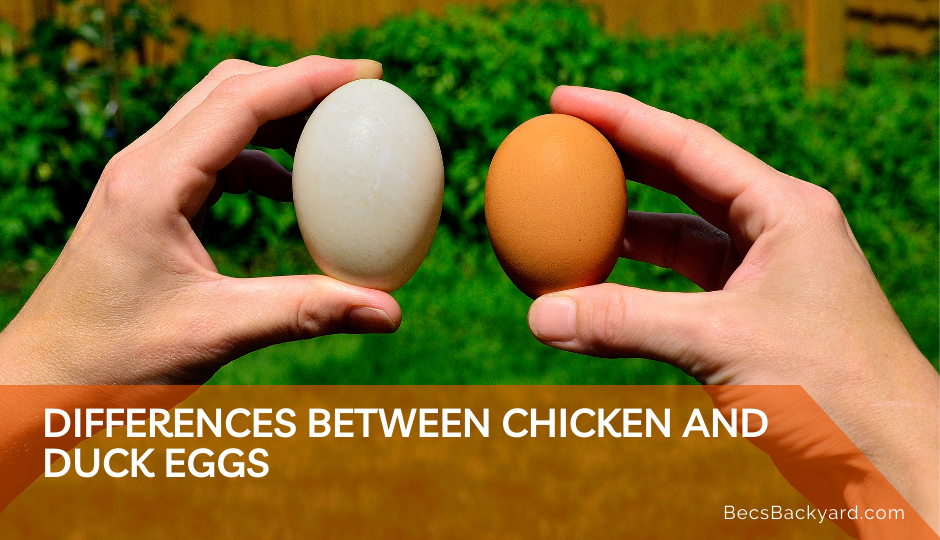Discover the Unique Differences Between Chicken and Duck Eggs

In this article, we will explore the unique differences between chicken and duck eggs. While both eggs are commonly consumed and used in various culinary dishes, there are several distinctions that set them apart. Understanding these differences can help individuals make informed choices when it comes to cooking, nutrition, and personal preferences.
Chicken eggs are the most widely consumed type of eggs worldwide. They are readily available and come in various sizes, ranging from small to extra-large. Chicken eggs have a hard outer shell that is typically white or brown, depending on the breed of the chicken. The yolk of a chicken egg is yellow or orange in color, while the egg white is clear and viscous.
On the other hand, duck eggs are less commonly consumed but are gaining popularity due to their unique characteristics. Duck eggs are larger than chicken eggs, with a thicker shell that is harder to crack. The shell of a duck egg is typically white or off-white in color. The yolk of a duck egg is larger and richer in flavor compared to a chicken egg. It is also more vibrant in color, ranging from deep yellow to orange. The egg white of a duck egg is thicker and has a higher protein content, making it ideal for baking and creating fluffy textures in recipes.
In terms of taste, chicken eggs have a mild and neutral flavor. They are versatile and can be used in a wide range of dishes, from breakfast favorites like scrambled eggs to baked goods like cakes and cookies. Duck eggs, on the other hand, have a richer and creamier taste. They are often described as having a more robust flavor profile, which can enhance the taste of certain dishes.
While both chicken and duck eggs are nutritious and delicious, they have distinct differences in size, shell color, yolk color, egg white texture, and taste. Understanding these variations can help individuals choose the right type of egg for their specific needs and preferences. Whether you prefer the versatility of chicken eggs or the unique characteristics of duck eggs, both options offer a wide range of culinary possibilities.

Taste Differences between Chicken and Duck Eggs
When it comes to taste, there are noticeable differences between chicken and duck eggs. Chicken eggs have a mild and delicate flavor, while duck eggs have a richer and more robust taste. The difference in taste can be attributed to the variations in the diet and lifestyle of these two birds.
Chicken eggs are commonly consumed and have a familiar taste that most people are accustomed to. They have a subtle flavor that is often described as slightly sweet and creamy. This makes them versatile and suitable for various culinary applications, such as baking, frying, or boiling.
On the other hand, duck eggs have a stronger and more distinct taste. They are known for their richer and gamier flavor, which some people find more flavorful and satisfying. The taste of duck eggs can be described as earthy and slightly gamey, with a hint of sweetness. Due to their stronger taste, duck eggs are often preferred by those who enjoy more intense flavors in their dishes.
The difference in taste between chicken and duck eggs can also be attributed to their nutritional content. Duck eggs tend to have a higher fat content compared to chicken eggs, which contributes to their richer taste. The higher fat content also gives duck eggs a creamier texture when cooked.
In terms of cooking methods, both chicken and duck eggs can be prepared in similar ways. They can be boiled, fried, scrambled, or used in baking. However, due to their larger size, duck eggs may require slightly longer cooking times compared to chicken eggs.
When it comes to availability, chicken eggs are more widely accessible and commonly found in grocery stores and supermarkets. Duck eggs, on the other hand, may be more challenging to find and are often sold in specialty stores or local farms. However, with the increasing popularity of duck eggs, they are becoming more readily available in some areas.
The taste differences between chicken and duck eggs are quite distinct. Chicken eggs have a mild and delicate flavor, while duck eggs have a richer and more robust taste. The choice between the two ultimately depends on personal preference and the desired flavor profile for a particular dish.
Nutritional Content
Chicken eggs and duck eggs have some differences in their nutritional content. While both types of eggs are a good source of protein, duck eggs tend to have a higher protein content compared to chicken eggs. This can be beneficial for individuals who are looking to increase their protein intake.
In terms of fat content, duck eggs have a higher fat content compared to chicken eggs. This can result in a richer and creamier texture when cooked. However, it is important to note that the fat in duck eggs is mostly monounsaturated and polyunsaturated fats, which are considered healthier fats compared to saturated fats.
When it comes to cholesterol, duck eggs have higher levels of cholesterol compared to chicken eggs. This may be a concern for individuals who are watching their cholesterol intake. However, it is important to note that dietary cholesterol does not have as significant an impact on blood cholesterol levels as previously believed. It is the saturated and trans fats in the diet that have a greater impact on blood cholesterol levels.
In terms of vitamins and minerals, both chicken eggs and duck eggs are good sources of essential nutrients. They contain vitamins such as vitamin A, vitamin D, vitamin E, and B vitamins. They also contain minerals such as iron, zinc, and selenium. However, duck eggs tend to have higher levels of certain vitamins and minerals compared to chicken eggs. For example, duck eggs are known to have higher levels of vitamin B12 and vitamin D.
Overall, both chicken eggs and duck eggs are nutritious and can be a part of a healthy diet. The choice between the two may depend on personal preferences, dietary restrictions, and availability. It is important to note that individuals with allergies or sensitivities to chicken eggs may find that they can tolerate duck eggs better, as the proteins in duck eggs are slightly different from those in chicken eggs.
While there are some differences in the nutritional content of chicken eggs and duck eggs, both types of eggs can be enjoyed as part of a balanced diet. Whether you prefer the taste and texture of chicken eggs or the richness of duck eggs, both options provide essential nutrients and can be incorporated into various culinary dishes.
Size Variations
When it comes to size, there is a noticeable difference between chicken eggs and duck eggs. Generally, duck eggs are larger than chicken eggs. While the size can vary depending on the breed of the chicken or duck, duck eggs tend to be about 50% larger than chicken eggs on average.
The larger size of duck eggs can be attributed to the fact that ducks are generally larger birds than chickens. This means that they have a larger reproductive system, which allows them to produce larger eggs. The size difference is not only noticeable in terms of length and width but also in terms of weight. Duck eggs can weigh around 70 grams, while chicken eggs typically weigh around 50 grams.
The larger size of duck eggs can have an impact on cooking and baking. Some recipes may call for specific egg sizes, and using duck eggs instead of chicken eggs may require adjustments in the recipe. Due to their larger size, duck eggs have a higher ratio of yolk to white compared to chicken eggs. This can result in richer and creamier dishes when using duck eggs.
In terms of taste, the size difference can also play a role. Some people believe that duck eggs have a stronger and richer flavor compared to chicken eggs. The larger yolk in duck eggs contributes to this difference in taste. However, taste preferences can vary from person to person, and some may not notice a significant difference in taste between the two types of eggs.
It is important to note that the size difference between chicken and duck eggs is not the only factor to consider when choosing which type of egg to use. Other factors such as availability, nutritional content, and culinary uses should also be taken into account. Ultimately, the choice between chicken and duck eggs will depend on personal preference and the specific requirements of the recipe.

Color Differences
One of the most noticeable differences between chicken eggs and duck eggs is their color. While chicken eggs typically have a white or light brown shell, duck eggs can come in a variety of colors ranging from white to shades of blue, green, or even black. This difference in color is due to the breed of the bird and does not affect the taste or nutritional content of the egg.
The color of the eggshell is determined by the pigment called protoporphyrin, which is deposited on the surface of the shell during the egg formation process. Chicken eggs have a white or light brown shell because they do not produce any pigments. On the other hand, duck eggs can have pigments such as biliverdin or protoporphyrin, which give them their unique colors.
The color of the eggshell can vary within the same breed of ducks, and it is not an indication of the egg’s quality or freshness. Some duck breeds, such as the Khaki Campbell or the Indian Runner, are known for laying eggs with blue or green shells. These eggs can add a pop of color to your breakfast plate or be used for decorative purposes.
When it comes to cooking with duck eggs, their color can also affect the appearance of the final dish. For example, if you use duck eggs in baking, the yellow yolk can give a richer and more vibrant color to cakes or pastries compared to chicken eggs. Additionally, the color of the eggshell can also seep into the egg white during cooking, resulting in a slightly colored egg white.
The color differences between chicken and duck eggs are purely aesthetic and do not impact the taste or nutritional content of the eggs. Duck eggs can come in a variety of colors, ranging from white to blue, green, or even black, while chicken eggs typically have a white or light brown shell. These color variations can add visual interest to your meals and provide unique culinary experiences.

Cooking Methods
When it comes to cooking methods, there are some differences between chicken eggs and duck eggs that you should be aware of. While both types of eggs can be cooked in similar ways, there are a few variations to consider.
One difference is the cooking time. Duck eggs generally take longer to cook than chicken eggs due to their larger size and thicker shells. If you prefer your eggs soft-boiled or poached, you may need to adjust the cooking time accordingly when using duck eggs.
Another difference is the texture of the cooked eggs. Duck eggs have a richer and creamier texture compared to chicken eggs. This makes them a great choice for baking, as they can add moisture and richness to cakes, pastries, and custards.
In terms of taste, some people find that duck eggs have a slightly stronger flavor compared to chicken eggs. This can be attributed to the higher fat content in duck eggs. If you enjoy a more robust and flavorful egg, then duck eggs might be the perfect choice for you.
When it comes to frying or scrambling eggs, both chicken and duck eggs can be used interchangeably. However, due to their larger size, duck eggs may take a bit longer to cook through. It’s important to keep an eye on the cooking process to avoid overcooking the eggs.
Lastly, it’s worth noting that duck eggs have a higher yolk to white ratio compared to chicken eggs. This means that if you’re using duck eggs in recipes that require separating the yolks from the whites, you may need to adjust the quantities accordingly.
While chicken and duck eggs can be cooked in similar ways, there are some differences to consider. Duck eggs take longer to cook, have a richer texture and flavor, and may require adjustments in recipes that involve separating yolks and whites. Whether you prefer the taste of chicken eggs or are looking to try something new, both types of eggs offer their own unique qualities in the kitchen.
Availability
When it comes to availability, there are some notable differences between chicken eggs and duck eggs. Chicken eggs are widely available and can be found in almost every grocery store and supermarket. They are produced on a large scale and are a staple in many households.
On the other hand, duck eggs are not as commonly available as chicken eggs. They are considered more of a specialty item and can be a bit harder to find. You may need to visit a specialty grocery store, a farmer’s market, or even a local farm to get your hands on duck eggs.
One reason for the limited availability of duck eggs is that ducks are not as commonly raised for egg production as chickens. Chickens are bred specifically for egg-laying purposes, while ducks are often raised for meat or as pets. This means that there are simply fewer ducks producing eggs compared to chickens.
Another factor that affects the availability of duck eggs is their shorter shelf life compared to chicken eggs. Duck eggs have a thicker shell and a higher fat content, which makes them more prone to spoilage. As a result, they may not have as long of a shelf life as chicken eggs, and this can limit their availability in stores.
However, despite their limited availability, duck eggs are still sought after by many people for their unique qualities. Some individuals prefer the richer and creamier taste of duck eggs, while others appreciate their larger size and higher nutritional content. If you are interested in trying duck eggs, it may be worth the effort to seek them out at specialty stores or local farms.
While chicken eggs are widely available and easily accessible, duck eggs are considered more of a specialty item with limited availability. Their unique qualities and distinct taste make them a sought-after alternative to chicken eggs for those who are willing to go the extra mile to find them.
Health Benefits
When it comes to comparing the health benefits of chicken eggs and duck eggs, there are a few key differences to consider. While both types of eggs are nutritious and can be part of a healthy diet, they do have some variations in their nutritional content.
One of the main differences is the fat content. Duck eggs tend to have a higher fat content compared to chicken eggs. This can be both an advantage and a disadvantage, depending on your dietary needs. The higher fat content in duck eggs can make them richer and creamier in taste, but it also means they have more calories. If you are watching your fat intake, chicken eggs may be a better option for you.
Another difference is the protein content. Duck eggs typically have more protein compared to chicken eggs. Protein is an essential nutrient that plays a crucial role in building and repairing tissues, as well as supporting the immune system. If you are looking to increase your protein intake, duck eggs can be a good choice.
In terms of vitamins and minerals, both chicken and duck eggs are good sources of nutrients. They contain essential vitamins such as vitamin A, vitamin D, vitamin E, and B vitamins. They also provide minerals like iron, calcium, and phosphorus. However, duck eggs tend to have higher levels of certain vitamins and minerals compared to chicken eggs. For example, duck eggs are known to have more vitamin B12 and vitamin D.
It’s important to note that individual nutritional needs may vary, and it’s always a good idea to consult with a healthcare professional or a registered dietitian for personalized advice. They can help you determine which type of egg is best suited for your dietary needs and goals.
While both chicken eggs and duck eggs are nutritious and can be enjoyed as part of a balanced diet, they do have some differences in terms of fat content, protein content, and vitamin and mineral levels. Whether you choose chicken eggs or duck eggs, incorporating eggs into your diet can provide you with a range of health benefits.
Culinary Uses
Culinary uses refer to the various ways in which chicken and duck eggs can be used in cooking and baking. While both types of eggs can be used interchangeably in many recipes, there are some differences in their culinary applications.
Chicken eggs are the most commonly used eggs in cooking and baking. They are versatile and can be used in a wide range of dishes, including omelettes, scrambled eggs, quiches, cakes, cookies, and more. The whites of chicken eggs are often used for meringues and to provide structure in baked goods, while the yolks add richness and flavor.
On the other hand, duck eggs have a slightly different culinary profile. Due to their larger size and higher fat content, duck eggs are often preferred for baking. They are known for producing baked goods with a richer and moister texture. The higher fat content also makes duck eggs ideal for making custards, ice creams, and other creamy desserts.
In terms of taste, some people find that duck eggs have a stronger and richer flavor compared to chicken eggs. This can make them a preferred choice for certain dishes, such as quiches or frittatas, where a more pronounced egg flavor is desired.
Additionally, duck eggs have a thicker and tougher shell compared to chicken eggs. This can make them more suitable for pickling or preserving, as they are less likely to crack during the process.
It’s important to note that while duck eggs can be used in place of chicken eggs in most recipes, their larger size means that you may need to adjust the quantities accordingly. One duck egg is roughly equivalent to one and a half to two chicken eggs.
Both chicken and duck eggs can be used in cooking and baking, there are some differences in their culinary uses. Chicken eggs are more versatile and commonly used, while duck eggs are preferred for baking and creating rich and creamy desserts. The taste, size, and shell thickness also vary between the two types of eggs, which can influence their culinary applications.
Conclusion
In conclusion, there are several unique differences between chicken and duck eggs. These distinctions can be found in their taste, nutritional content, size, color, cooking methods, availability, health benefits, and culinary uses.
When it comes to taste, chicken eggs are known for their mild and versatile flavor, while duck eggs have a richer and creamier taste. This difference in taste can influence the choice of eggs in various recipes and dishes.
In terms of nutritional content, duck eggs are generally higher in fat and cholesterol compared to chicken eggs. However, they also contain more protein, vitamins, and minerals. Depending on individual dietary needs and preferences, one may choose one type of egg over the other.
Size variations are another noticeable difference between chicken and duck eggs. Duck eggs are typically larger than chicken eggs, with a thicker shell. This can affect the cooking time and portion sizes when using these eggs in recipes.
Color differences are also apparent between the two types of eggs. Chicken eggs come in various shades of white and brown, while duck eggs have a unique pale blue or green color. This distinction can add visual appeal to dishes and may be preferred for aesthetic reasons.
Cooking methods may vary when using chicken or duck eggs. Due to their higher fat content, duck eggs are often preferred for baking, as they can provide a richer texture and flavor to baked goods. Chicken eggs, on the other hand, are commonly used for everyday cooking and frying.
Availability can also differ between chicken and duck eggs. Chicken eggs are widely available in most grocery stores and markets, while duck eggs may be more challenging to find. However, with the increasing popularity of duck eggs, they are becoming more accessible in specialty stores and farmers’ markets.
Both chicken and duck eggs offer health benefits. They are excellent sources of protein, vitamins, and minerals. However, individuals with specific dietary restrictions or health conditions may need to consider the differences in fat and cholesterol content when choosing between the two.
Lastly, the culinary uses of chicken and duck eggs can vary. Chicken eggs are commonly used in a wide range of dishes, from breakfast favorites like omelets and scrambled eggs to desserts like cakes and custards. Duck eggs, with their unique taste and texture, are often used in gourmet recipes and specialty dishes.
Understanding the unique differences between chicken and duck eggs can help individuals make informed choices when it comes to cooking, nutrition, and personal preferences. Whether it’s the taste, nutritional content, size,






